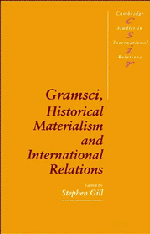Book contents
- Frontmatter
- Contents
- Notes on contributors
- Acknowledgements
- Gramsci and global politics: towards a post-hegemonic research agenda
- PART I PHILOSOPHICAL AND THEORETICAL REFLECTIONS
- PART II PAST, PRESENT AND FUTURE
- 5 Gramsci and international relations: a general perspective with examples from recent US policy toward the Third World
- 6 The three hegemonies of historical capitalism
- 7 The hegemonic transition in East Asia: a historical perspective
- 8 Intemationalisation and democratisation: Southern Europe, Latin America and the world economic Crisis
- 9 Soviet socialism and passive revolution
- 10 Structural issues of global governance: implications for Europe
- References
- Index
- Titles in the series
8 - Intemationalisation and democratisation: Southern Europe, Latin America and the world economic Crisis
Published online by Cambridge University Press: 10 January 2011
- Frontmatter
- Contents
- Notes on contributors
- Acknowledgements
- Gramsci and global politics: towards a post-hegemonic research agenda
- PART I PHILOSOPHICAL AND THEORETICAL REFLECTIONS
- PART II PAST, PRESENT AND FUTURE
- 5 Gramsci and international relations: a general perspective with examples from recent US policy toward the Third World
- 6 The three hegemonies of historical capitalism
- 7 The hegemonic transition in East Asia: a historical perspective
- 8 Intemationalisation and democratisation: Southern Europe, Latin America and the world economic Crisis
- 9 Soviet socialism and passive revolution
- 10 Structural issues of global governance: implications for Europe
- References
- Index
- Titles in the series
Summary
INTRODUCTION
At this particular moment in ‘world time’ we bear witness to some sweeping changes in state and world-order structures, in part the result of the global economic crisis of the last two decades, in part bound up with the crisis and eventual demise of the bipolar system of superpower politics. The break-up of Soviet dominance and American hegemony has occurred along with an unprecedented renaissance of liberal values, economic and political. This upsurge in liberalism is both the result and cause of changing class, state and world-order structures.
There are two obvious manifestations of this process of liberalisation: first, the rise of neo-liberal politics, initially in Chile after the military coup in 1973, and highlighted in the policies of President Reagan and Prime Minister Thatcher in the 1980s; and, second, the shift from authoritarianism to formal political democracy in a number of developing countries, and particularly in southern Europe in the 1970s and Latin America in the 1980s. Both phenomena are concomitants to the world economic crisis of the 1970s and 1980s.
In comparing the different processes of democratisation in Spain, Portugal and Greece in the mid-1970s and in several Latin American countries in the period thereafter, some questions come to mind. First, to what extent are the transitions to democracy in the three southern European countries interrelated, and can be explained on common grounds, both in terms of timing and content?
- Type
- Chapter
- Information
- Gramsci, Historical Materialism and International Relations , pp. 213 - 236Publisher: Cambridge University PressPrint publication year: 1993
- 3
- Cited by

